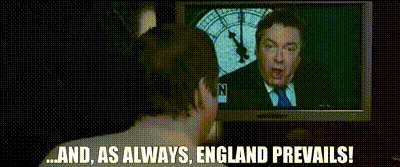To Drink from the Rushing Rapids without Drowning
All the news that's fit to drink.
Conflict is the heart of storytelling. That’s why any randomly chosen scene from “All My Children” (I’m damn near forty, yes I grew up watching that daytime soap opera) displays a conflict unfolding.
Imagine the task for these writers: to, every weekday, in every scene, maintain and build a level of conflict that has been waxing and waning but never fully resolving for decades. Keep that hacky sack of audience emotions aloft, or they will change the channel and you’ll go off the air. Sounds like a challenging job, if you ask me! Real Sheherazade shit.

That reminds me of CNN.
Back when I was in school, Lou Dobbs used to host a show on CNN. I rarely watched TV at the time, caught up in the daily struggles of school. I can’t tell you what the show was usually like, all I know is that in my random sample (n=1) Lou Dobbs kept going on and on about how the government of a developing country kept showing people singing on their state television in the wake of a horrific natural disaster. As I recall, he was reading reports of the devastation over the clips of the performers. The juxtaposition, I felt, was intended to make me angry - angry at that foreign government for airing something frivolous while the people died.

I did not feel anger. I felt disgust for Dobbs.
Who cares if there is a two minute clip of singers on national television in a country that was just devastated by disaster? Can’t people seek some relief in entertainment as their world crumbles?
Okay maybe I do feel anger, but not at the victims of tragedy.
But stoking the emotions of the audience in an unfolding and never-resolving conflict is not just a job for soap opera writers; it is also the job of reporters of the news. It doesn’t have to be! But the news faces the same pressures as daytime soap operas: if they drop the drama for a moment, they will lose viewers, and if they lose viewers, they may get kicked off the air.
People talk a lot about social media being a brand new thing that is hacking our brains and getting us hooked on ragebait to stay engaged on toxic platforms. Yes, it’s different from the propaganda of Dobbs or the storytelling of Sheherazade or the trashy drama of soaps. But the emotion the platforms are evoking and hacking are the same ones we’ve been hacking since the birth of story. Only now the task of writing is distributed to everyone on the platform, and the algorithm’s job is to allocate eye balls to content to maximize likelihood of retention. It is no surprise that the ones who can consistently create drama are the ones whom the algorithm favors.
Social media, cable news, daytime soaps; they are all trying to weave a narrative filled with conflict to evoke strong emotion that keeps you coming back for more.
And we’re human! And it works! And it’s not like we can change our nature anytime soon. Feels like equilibrium.
So how do you deal with it?
Some people nope out. They just ignore the stories altogether. They allow culture to flow beside them but not around them, by stepping out of the stream of content. Okay, but in this swiftly tilting planet I don’t know how you can feel safe without at least dipping your toes in the stream of information to keep abreast of the latest most dangerous things the government is doing. (Yes, I’m biased to think the government is the most dangerous institution. No, I do not think it’s the only dangerous institution. We can debate that later.)
Other folks drown themselves in the river. They lose themselves. They cannot tell themselves apart from the rushing torrent. Every drama that arises is a part of them. It must be! It is how they feel community. It is how they make sense of the world. They pick a side in the battle between good and evil and ignore the fact they cannot breathe with their head below water.
Look, corner solutions are usually reserved for linear programming problems. And in the case of news consumption, there are diminishing marginal returns. Which means it is unlikely to be optimal to adopt either of these extreme strategies of completely ignoring or completely immersing yourself in the current narrative.

So I will advise you to do something. But I warn you that it sounds impossible.
Practice being in the stream without being carried by the stream.
I’m not saying don’t feel things when you stay informed. It’s totally good and natural to feel things! We aren’t made of stone out here. But notice the feelings, use your feelings to consider the likelihood the information presented to you is being tailored to evoke a feeling (either by propagandists or by the algorithm or by the combo). Identify the feelings and then let them pass through you. Let them wash back into the stream.
Yes, I am angry about the news. Every. Day. What I ask of you is a constant struggle for me.
Why am I asking you to do something that seems impossible, then?
Because I want to ask you to consider a framework that is a little strange. Usually when we are reacting to the news it is because we are being activated on at least one of the following fronts, though we usually do not consider the difference between these facets within ourselves:
Goals. These are your hopes for society. When your goals are attacked you may think, “What happened in this news story demonstrates that we are moving away from one of my goals for society.” Some examples of goals: eliminate poverty; free movement of peoples; safeguard reproductive rights.
Strategies. This is how you want your goals achieved. A strategy you would support is dependent on your model of how the world actually works. If you think this rock keeps terrorists away, you may want to sell this rock to the Pentagon. Any news story about the Pentagon not buying your magical rock is going to disappoint you. When your strategies are attacked, you may think, “What happened in this news story demonstrates a poor strategy for achieving one of my goals.” Some examples of strategies: increase minimum wage; lower quotas on immigration; enshrine reproductive rights in the constitution.
Values. These are the lines you don’t want society to cross in order to achieve your goals. Ends may justify means — but not when they violate your values. When your values are attacked, you may think, “What happened in this news story violated my values for how we should try to achieve my goals for society.” Some examples of values: people need to work in order to receive government benefits; our citizens need to be valued above non-citizens; protesting needs to remain peaceful.
When the news evokes a feeling in you, can you tell which of these three is being attacked?
I’m asking you to please try to separately identify these parts of your political identity. When you can distinguish between your goals, strategies, and values, it becomes easier to find common ground with folks with whom you can have civil disagreements and also easier to identify sources and ideas that are so far removed from you that they are not worth your time.
I invite you to give it a shot, to wade into the rushing rapids, to feel its violence wash over you, to feel it attack your identity — your goals, your strategies, your values — to feel your emotions rise to protect your identity, to recognize this is happening, and to let the emotions wash out of you. What remains with you when you return to dryland should be knowledge of how the world is changing and the distance necessary to consider how you should let that affect your identity.
The media is not changing anytime soon, but you can grow strong enough to withstand the never-resolving drama.



